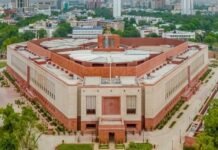Shri Radha Mohan Singh added that India is among the world’s leading coconut producer nations. Kerela has a significant contribution in this. During 2014-15, 32 percent land area of Kerala in the year 2014-15 and 24 percent of production has been recorded in the country. In the year 2015-16, coconut products worth 1450 cr. rupees have been exported, according to Coconut Development Board figures.
Shri Singh said that Kerala has been playing a leading role while formulating bio diversity strategy of the state. Apart from this, the livestock and fisheries sector are getting momentum. Keeping in view the agricultural potentialities, Indian Council of Agricultural Research (ICAR) has established five research institutes (Central Plantation Crops Research Institute- CPCRI, Indian Institute of Spices Research-IISR, Central Tuber Crops Research Institute-CTCRI, Central Marine Fisheries Research Institute-CMFRI, Central Institute of Fisheries Technology-CIFT) as well as 14 agriculture science centers. In addition to this, central government has also been supporting state agriculture universities.
Shri Singh said that the Ministry of Agriculture has initiated a number of schemes for the welfare of the farmers. Under Pradhan Mantri Krishi Sinchaee Yojana (PMKSY), irrigation schemes have been launched in Karpujha and Mowatupujha in Kerala which are to be completed by March 2018. Under Soil Health Card Scheme a target of 7,05,420 Soil Health Cards had been fixed for distribution in Kerala. However, only 1,32,828 Soil Health Cards have been distributed in Kerala as yet. Under Paramparagat Krishi Vikas Yojana (PKVY), 119 cluster as a whole are in place for which a sum of Rs. 382.22 lakh have been released. However, the utilization certificates are awaited from state government in this regard. Pradhan Mantri Fasal Yojana (PMFBY) is a revolutionary insurance scheme for the farmers. But this scheme has not been implemented in Kerala till now. More than 250 Mandis have been linked nationwide with National Agriculture Market (e- NAM) by 6th September, 2016 and a target has been laid down to link 585 mandis by March, 2018. But e – NAM Scheme has not been launched in Kerala. The Minister appealed to the state government to implement different central agricultural schemes for the welfare of the farmers.
Shri Radha Mohan Singh appreciated the efforts of scientists, officers and employees for conducting various agriculture programmes during the centenary year of the Institute.




























